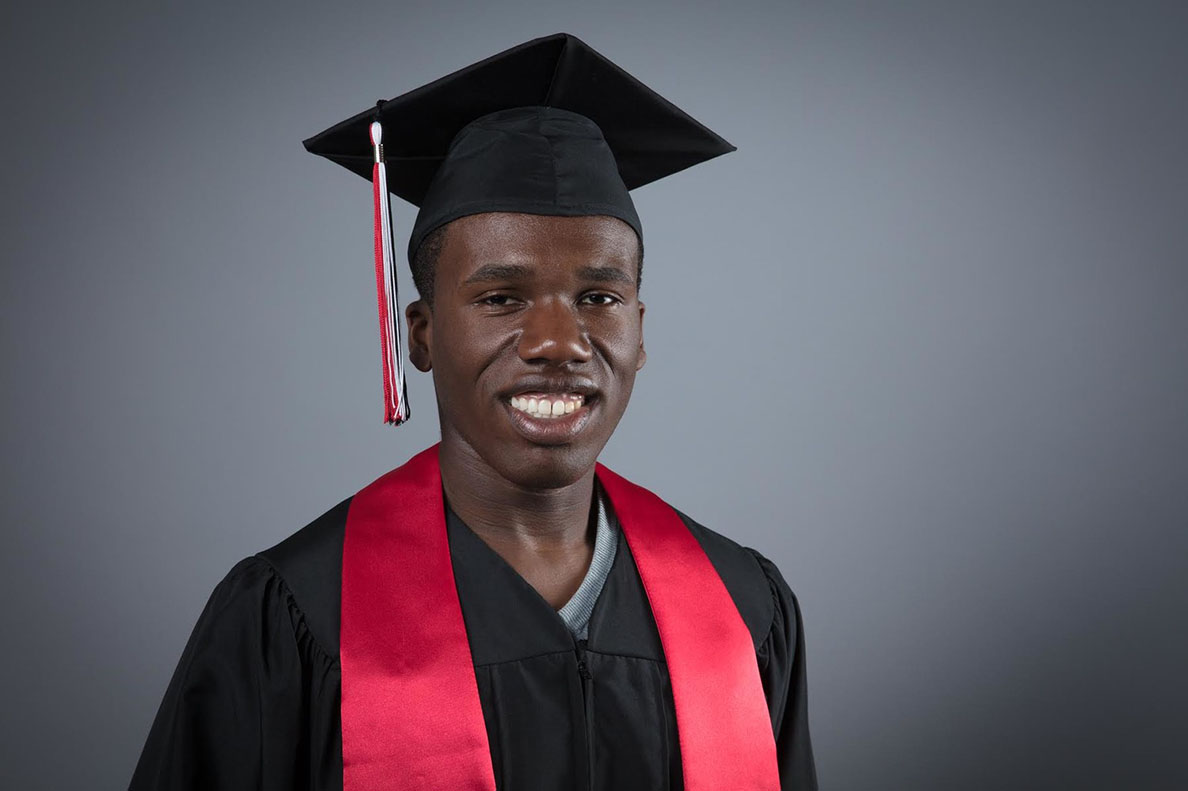
Sprinting Toward the Finish Line
- BY ILENE LELCHUK
- PHOTOGRAPHY BY GARVIN TSO
- May 15, 2018
The circumstances of Noah Siegel’s birth and early life pointed to a very different future than where he stands today as a Cal State East Bay athlete and graduate poised to pursue a doctorate in microbiology and immunology.
“At one point, we didn’t even think he’d graduate high school.”
Siegel’s father died in a clash of gang violence in the Bay Area before Noah was born. His young mother, feeling she couldn’t care for a newborn, offered him up for adoption while still lying in her hospital bed in Vallejo.
A couple from San Diego County, an attorney and his wife, eagerly adopted this baby into their growing family. But by six months, something seemed “off.”
“As an infant, he didn’t smile,” said Siegel’s mother Marsha. “He had no facial expression. He wouldn’t look at you directly.”
Testing revealed Siegel was on the autism spectrum. And what followed was a challenging childhood filled with therapies, special education, tutors and angry outbursts, his mother said.
“At one point, we didn’t even think he’d graduate high school,” she said. “That’s what I find amazing about Noah, that all of a sudden when he got to his senior year, he decided he wanted to pursue an education.”
FINDING HIS FOCUS
These days, at 6 feet tall with the slender build of a runner, Siegel smiles so easily and confidently that it’s hard to believe he was anything but this charming, funny 23-year-old who is set to graduate from university and advance to studying virology in a Ph.D. program at UC Davis next fall.
But back then, school couldn’t hold Siegel’s attention. He failed and had to retake algebra. He barely passed physics. He continued to need academic and emotional supports.
“Going through middle and high school, it was harder for me to focus. I felt that I had too much energy,” Siegel said.
Then he found the track team, and everything clicked.
It was his senior year at San Dieguito High School Academy in San Carlos. Siegel had previously tried wrestling and lacrosse, but found his passion for track and field.
He was fast — running the 1600 meters in 4:47 minutes and the 5K in 17:30 minutes — but not the fastest. But it didn’t matter as much as the fact that running grounded him and led to a new focus, confidence and success. Success including taking and passing a physics course that his high school counselor had advised him not to take.
“I didn’t like the fact that they were essentially telling me I wasn’t intelligent enough to take the class, so I took it,” said Siegel, who these days tutors Cal State East Bay physics students at the university’s Student Center for Academic Success.
A SENSE OF BELONGING
After two years at Palomar Community College where he raced on the track and field team and made the Dean’s List, Siegel was drawn to Cal State East Bay in 2015. It was his mother’s alma mater, it has a forensics program (an earlier interest) and he qualified for the men’s track team.
As a Pioneer, cross country events were his strength, running the 8K in 27:19 and his hard work academically earned him a spot on the California Collegiate Athletic Association’s All-Academic Team for several seasons.
Managing the hectic life of a student-athlete can be challenging. In addition to attending classes, Siegel sometimes spent three to four hours at track practice a day, worked at Cal State East Bay’s athletics facility, tutored physics students, earned his certification as a phlebotomy technician and performed lab work for biochemistry professor Dr. Chul Kim’s research of the brome mosaic plant virus.
The university’s support helped Siegel thrive.
“The athletics department definitely gave me the sense of unity and belonging,” he said. “When I joined the team, I was instantly forced to make 24 new friends. It definitely motivated me.”
Professors like Daniel Barsky in the physics department and Nazzy Pakpour from biological sciences served as academic guides and cheerleaders.
“He is really memorable because he always has such a positive attitude,” Pakpour said with a laugh. “A positive attitude and terrible handwriting. I also am impressed that he knows very much what he wants to do in terms of pursuing his Ph.D. He is not very daunted by things.”
“I wanted to make my parents see it was worth it to have adopted me.”
Siegel initially thought he’d attend a year-long clinical lab science program and then pursue a Ph.D., but Barsky guided Noah to a more direct and affordable route to U.C. Davis after explaining that many grad schools will pay students a stipend in exchange for research, teaching, or other work.
“My interactions with Noah opened my eyes to the needs of other graduating students here,” said Barsky, who wrote his recommendation letter for UC Davis. “They don’t know about these possibilities. He can be inspiring to a lot of students.”
At Davis, Siegel will attend a five-year program and plans to study microbe infections and has a particular interest in the family of pox viruses.
“I am fascinated by how a virus interacts with the body, how something so small can affect something so big,” he said.
When asked to name someone he looks up to, Siegel doesn’t hesitate to mention his parents, Marsha and Boris, who also adopted two other children. He has three siblings in total, and he’s right in the middle.
His hard work has been for them as much as for himself.
“I wanted to make my parents see it was worth it to have adopted me,” he said. “I look up both to them. I want to succeed.”